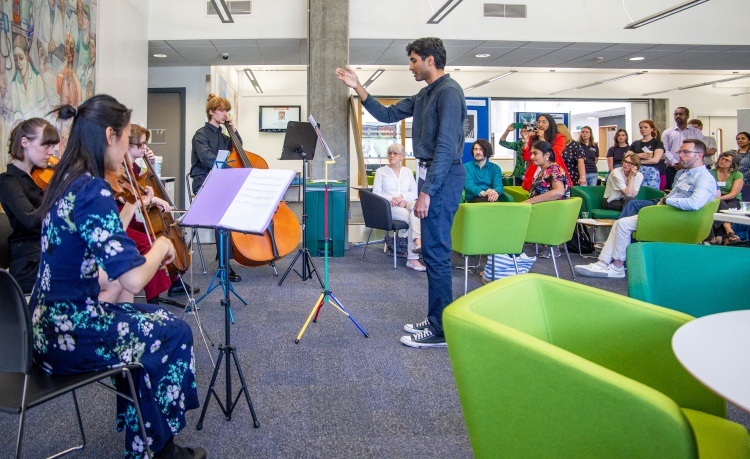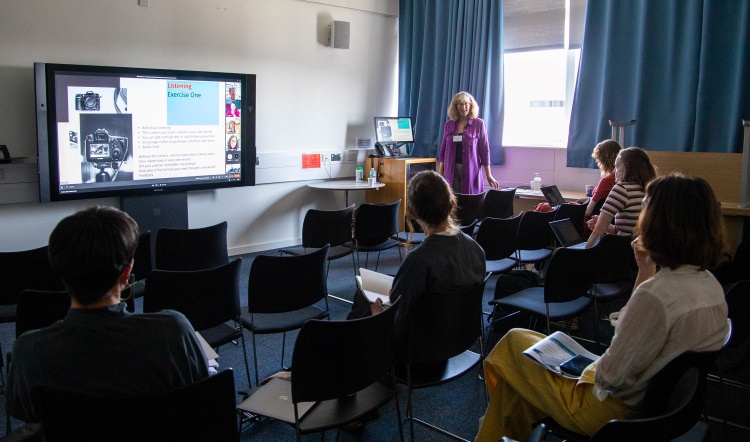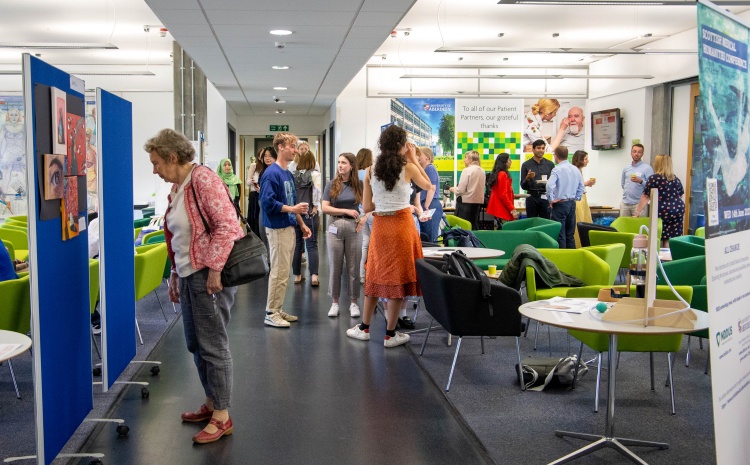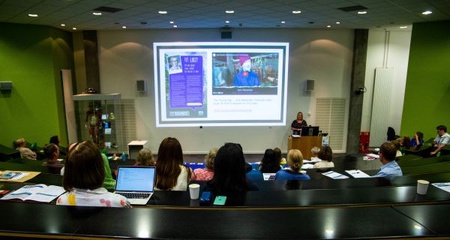Hi! I am Ekiyokere, a third-year PhD student (Sociolinguistics) in the School of Language, Linguistics, Music, Visual Arts and Culture at the University of Aberdeen. Over the summer, I attended the Scottish Medical Humanities Conference.
At first, I could not figure out the connection between the Humanities and Medical Sciences, but as the event gradually unfolded, it began to make sense. The theme of the conference, All Change! New directions... Exploring process, outcomes and possibilities through scholarship and creativity was apt; it was an eye-opening and insightful experience. Medical Humanities is an interdisciplinary field that explores health-related experiences and focuses on capturing and reflecting on patients' perception of self and condition via the microscopic lens of innovative practice-based methods. Humanities and Medical sciences did share a common focus – HUMAN EXPERIENCES. In both disciplines, it is acknowledged that the human participant is an embodiment of the experiential (existential) and the physical (natural), and this becomes the medium through which the phenomena being investigated manifests itself, whether in humanities terms (through recording and interpreting language, teaching or learning experiences) or in medical or clinical terms (through documenting and interpreting the experiences of disability or illness). The Scottish Medical Humanities Conference, as I came to understand, is an event organised as a routine intervention in that merging. The conference brought together a wide audience ranging from healthcare, arts and humanities students to educators, researchers, practitioners and health professionals. The one-day event covered film, music, graphic novel approaches and workshops. In this blog, I hope to convey my personal learnings and reflections from the conference.
One of the highlights of the conference was John Saganty's musical performance. Music, rather than autoethnography, was used as an exploratory approach to interpreting experiences of cancer. The patient's journeys had been strung into quartets that took listeners like me through distinct aspects of the unseen roller coaster that distinct stages of cancer present and the anxieties which were too difficult to explain in words. This certainly impacted my understanding of cancer experiences and registered a heightened sense of empathy in my consciousness. While the musical performance was entertaining, it provided insight into the dynamism of research practice, specifically as it concerns broadening the researcher's understanding of phenomena through creative adaptive enquiries that tend to be more integrative and less monotonous. More importantly, and as a doctoral student, Saganty's performance reminded me of the importance and place of empathy in research. Empathy enables us to position ourselves to feel, see, and taste as participants do and helps researchers to seek the best approaches and methods to interpret data through the lens of those who live with the condition or whatever our investigative interests are.

The second was the film screening of The Edge of Dreaming by Dr Amy Hardie. As an international student from Africa, I am used to the cultural interpretation of dreams as a connection between the physical and an alternate world (spiritual). Dreams about dying would be immediately subjected to exorcist-like prayer sessions with the dreamer screaming, 'Je-e-esus, J-e-e-esus, deliver me!' until they were convinced that such fate had been reversed. For this reason, I was intrigued to see a different perspective on the mind's activity whilst the human body slept, specifically, how the brain processed information beyond the five-sense realm. It was more interesting to see how Amy could document a unique experience of the unseen (subconscious state) and the way she tried to make sense of several embodied cognitive episodes that routinely shaped her conception of the life in the real world. There were several things I took away from this experience. The first is that cognition is distributed across the brain, body and world, a hybrid combination which are important considerations when dissecting data from human participants. Next, individual experiences can be translated into something meaningful, and this has some impact on the way we perceive concepts or ideas in the real world. And that the value of the unseen aspects of research data which tend to be neglected or overlooked, enriches not just our research experience but can provide insightful trajectory on specific phenomena.

The Listening, Looking, Understanding: Documentary practice as Research workshop supported by the Scottish Graduate School for Arts and Humanities (SGSAH) and the George Washington Centre for Art and Visual Culture was the final highlight of the conference for me. I became interested in the workshop after reading that previous knowledge about documentary theory/practice was not necessary for participation. I had always associated documentaries with film students, so the call for participation on the subject was timely. The SGSAH workshop on Documentary Practice as Researchwas informative and emphasised the role of flexibility and adaptability of methods for researchers with a fieldwork component to their study. As a student of language and linguistics, I have been trained to make sense of data and tell the stories of the 'Other' through writing. The presence of a camera would present issues of the observer's paradox and tend to influence behaviour. However, this workshop exposed me to the distinct skills such as listening, looking, and understanding needed for successful observation and interpretation of data; and documentary is another creative route of engagement with participants’ stories through the lens of a camera. As a Sociolinguistics major under the supervision of Professor Robert McColl Millar, my research explores the performative aspects of Nigerian Pidgin use and on a broader plane, seeks to understand social constructions of identity and relationship negotiations in daily life. Most stories about language use or behaviour I explore do not just depict projective acts, but they tend to be performative as well. This implies that anyone engaged in participatory research can be creative in their approach to data and skilful storytelling using modern technology to capture different angles of participants' lives and to understand their interaction with the environment. My encounters with participants on the field through interviews, looking at different aspects of the investigated issue using shots and the observations documented as fieldnote records can be creatively pieced together and allow for a story to unfold in front of the viewers (for instance, a conference audience or a departmental seminar).

The discussions at the end of each session were insightful. Personally, the most interesting discussions were those regarding cognitive humanities and the interactions between creativity and meaning-making. FilmMedicine allows for dialogue between constructed knowledge about a condition (epilepsy and Parkinson's, for instance) and actual experiential encounters of epistemological relevance (the unseen, lived experiences of those whose autonomous nervous judgements such conditions disrupt). Now, I bet you saw the 'medical' and thought this has nothing to do with me! Well, believe me, it does!
The Scottish medical humanities conference, as has been recounted in my experience above, exposes students to creative and innovative methods of approaching participatory research. By attending this conference, you get to improve your observational and interpretive capacity by becoming aware of those taken-for-granted experiences because of tendencies to be fixated on a set of pre-listed research goals. You also get to develop new skills that are transferrable and applicable to your primary research. And let's not forget, a conference is a good time to relax and let someone else host you!
The closing thoughts for the day by Dr Fiona Johnstone highlighted reflections at the end of the conference. Some of these include the value of lived experiences; health-related experiences are interconnected with reality. In addition, diversity exists within the local communities we participate and interact; and the condition and experience cannot be placed at two extremes (binary) because both tend to stay with the individual. This experience was extraordinarily rich and eye-opening because I have been exposed to the range of creative, collaborative research pathways I can get involved in and the diversity (that is, resonances between the different disciplines) that such collaborations entail. Overall, it was a great experience and a day well spent at the Suttie Centre!


